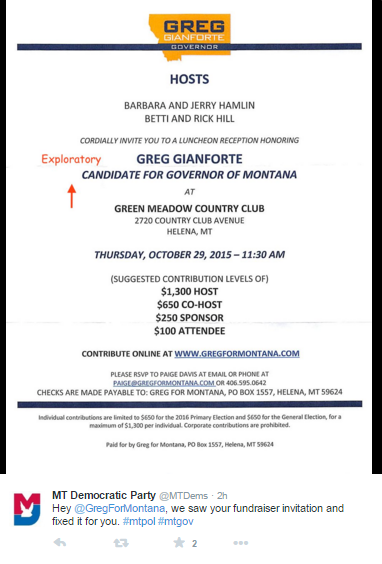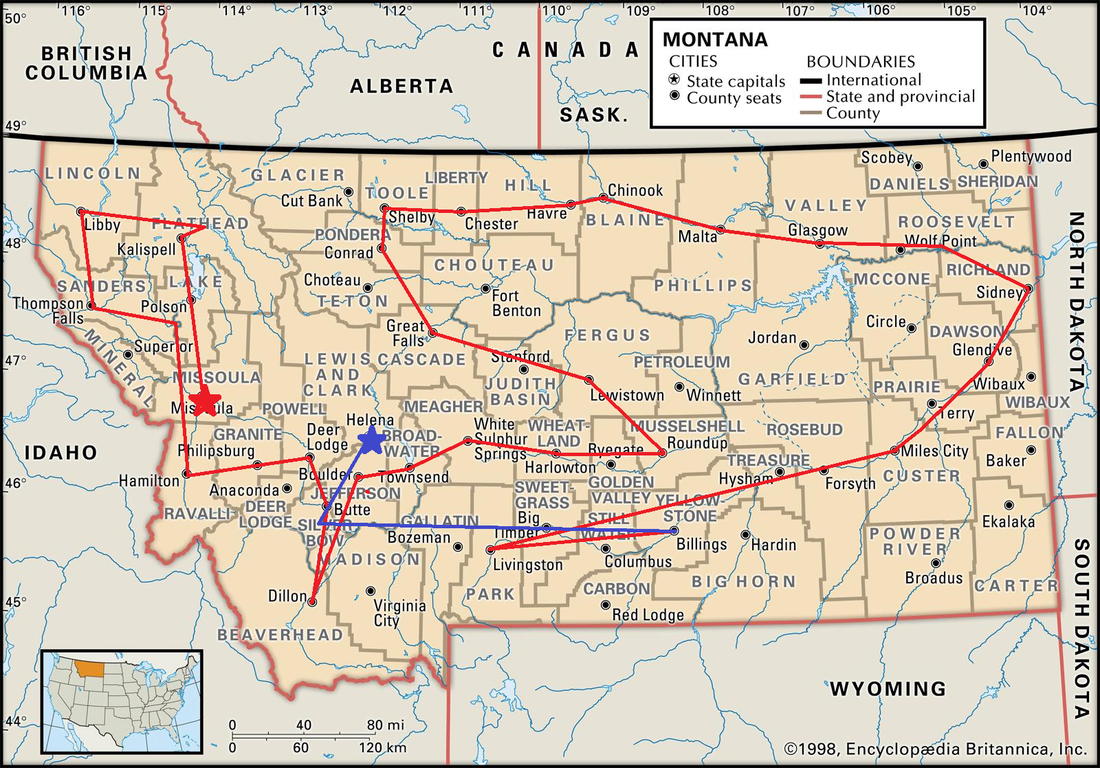 If it looks, sounds and smells...
If it looks, sounds and smells...
Are you in or are you out?
And how much damn money can you actually raise before it’s clear to everyone that you’re in?
- $500,000?
- $1 million?
- $5 million?
Who decides when an exploratory committee/candidacy has overstepped their bounds?
Who determines when a candidate needs to get real or get the hell out of town?
I was thinking about these things today when I saw this tweet from the Montana Democrats:
My god, even the Democrats only charge $35 to $50 for the lowly “attendee” designation.
Gianforte, however, charges $100.
We’re dealing with a different class of people here, the Gianforte supporters. Their rich, entitled, and damn it, they want you to know it.
Remember, this is an afternoon event too – 11:30 AM – not some evening dinner event.
Yes, Gianforte supporters have the time to lounge around on a Thursday afternoon.
- Do they work?
- Have they ever worked?
Maybe they live off the work of others – I don’t know. I don’t know a lot about Gianforte supporters, but I’m pretty sure I’m not one.
I mean…$100 for a lunch?
What else do I get with that, the honor of hearing the man speak? Hell, he was going around not more than 6 months ago doing that for free!
Why is he still exploring? What benefits does being a non-candidate bring?
Let’s explore.
Exploratory Committees: What We Know
Cool – what else is there?
According to this Connecticut Mirror post from 2013, “under the Citizens Election Program,” people can raise $250,000 with $100 capped-contributions from individuals.
It also mentions that “the maximum donation to an exploratory is $375.”
Why does that matter?
It was a gubernatorial race where this happened, one I found rather quickly. Maybe there are more out there.
So…what else?
According to a 2011 report in The Atlantic, “an exploratory committee doesn’t have to report its finances to the FEC, whereas a campaign committee does. Until a campaign is official, the exploratory committee goes unscrutinized.”
Now we’re getting somewhere.
What Gianforte is trying to do is raise as much money as he possibly can before he has to report where that money came from.
He doesn’t want you to know which individuals, which corporations, which PACs, and which out-of-staters gave to his campaign.
He also doesn’t want you to know how much they’ve given.
Why?
Why doesn’t someone running for an open and public office of state government want you – the people he purports to represent – from knowing who’s giving him money?
Could it be that the people giving him the money are the ones he wants to represent and not you?
Could it be that Greg Gianforte doesn’t give one flying fuck about you or your family?
I think that’s as clear as day.
The nice thing about exploratory committees is that they have to “adhere to the same restrictions as a regular campaign,” the Atlantic states, “including a $2,500 per-donor, per-election fundraising limit and a ban on corporate and union donations.”
I’m not sure what unions would give to Gianforte, myself. I do know that Gianforte can use this time to raise money for both the primary and general elections, as those are two separate contests.
In effect, Gianforte could raise all of his money now, before he even has to file to enter the primary.
When does he need to report that fundraising…or does he?
Think about it, how beneficial it would be to a corporate candidate to not report any of their fundraising.
They will have to report their spending, however, and that’s when you can get them. We saw last go-round that TV ads expenditures are reported now.
Take a look at the FEC exploratory guidelines for 2012 presidential candidates (the FEC also has something going back to 2010 called Testing the Waters that might interest some of you).
If Gianforte were to do any of these 5 things then the campaign would be official:
- Make a statement referring to himself as a candidate;
- Using “general public political advertising” to publicize the campaign;
- Raising more money “than what is reasonably needed to test the waters;”
- Conducting activities “over a protracted period of time;”
- Taking action to “qualify for the ballot.”
Clearly, the Montana Democrats can nail Gianforte. He didn’t hire serious campaign staff until recently so there’s bound to be some mistakes in “the record.”
Go back to the videos, the soundbites – get that clip of him calling himself “a candidate.”
Do that and you’ve got him.
The only other way is convincing Motl to declare this candidacy official. There you might get the reasonable time or protracted period argument to work.
Really though…does it matter?
Even if we know who is giving Gianforte money, is it going to change anything or convince anyone?
Does anyone even care, this early in the race?
So these are all things to consider.
Maybe it’ll help with strategy.
Strategies for Defeating Gianforte
- Identity his weak points;
- Develop a 3- to 5-point plan around those;
- Write something snappy and memorable;
- Pummel the voters with it.
Additionally, I think this could work:
- Identify Montana’s weak points;
- Develop a 3- to 5-point plan around those;
- Write something snappy and memorable;
- Pummel the voters with it.
Going further, this strategy might work:
- Decide if you’re going to look forward or look back;
- Develop points on achievements or goals;
- Write something snappy and memorable;
- Pummel the voters with it.
When I was an English teacher you had to say a word about 10 times before a student would remember it…and there was still no guarantee they’d understand it.
Voters are about the same.
Right now Gianforte is preying upon their ignorance.
He can’t do that forever, but he’ll try. His exploratory committee is enabling him to do that.
Could it be undone?
Probably.



